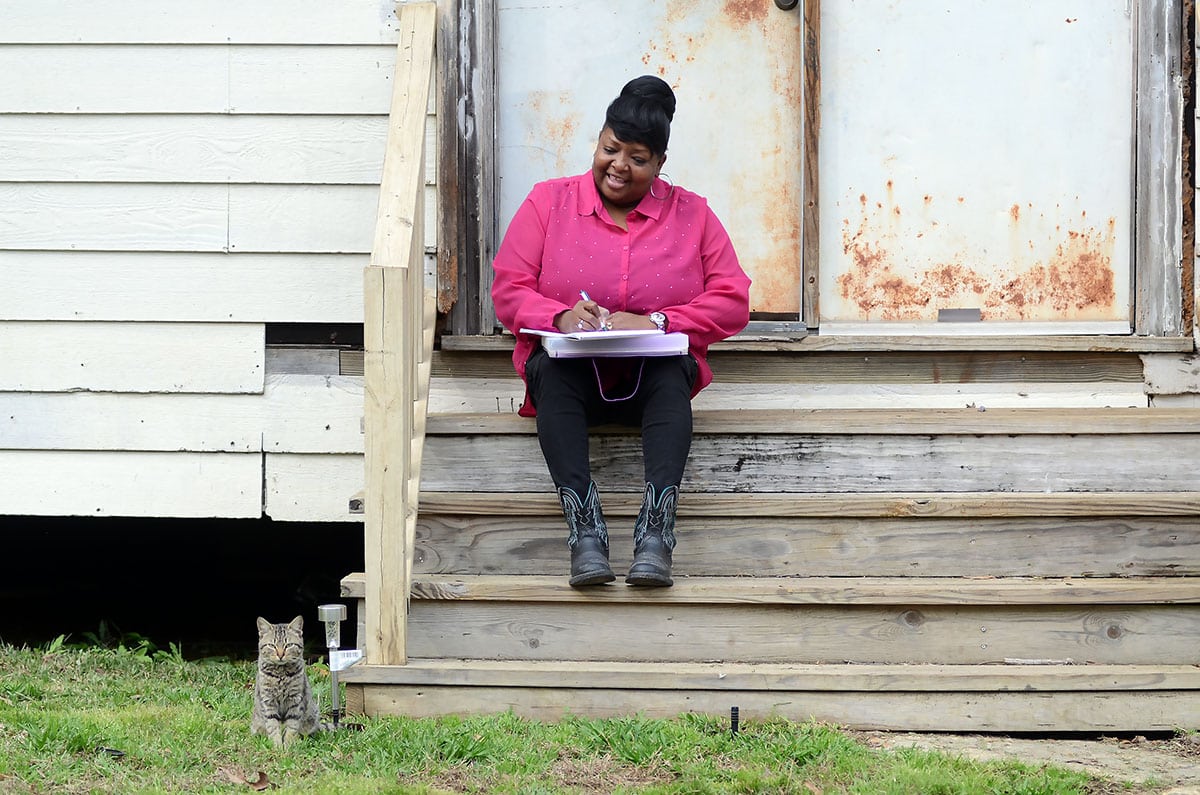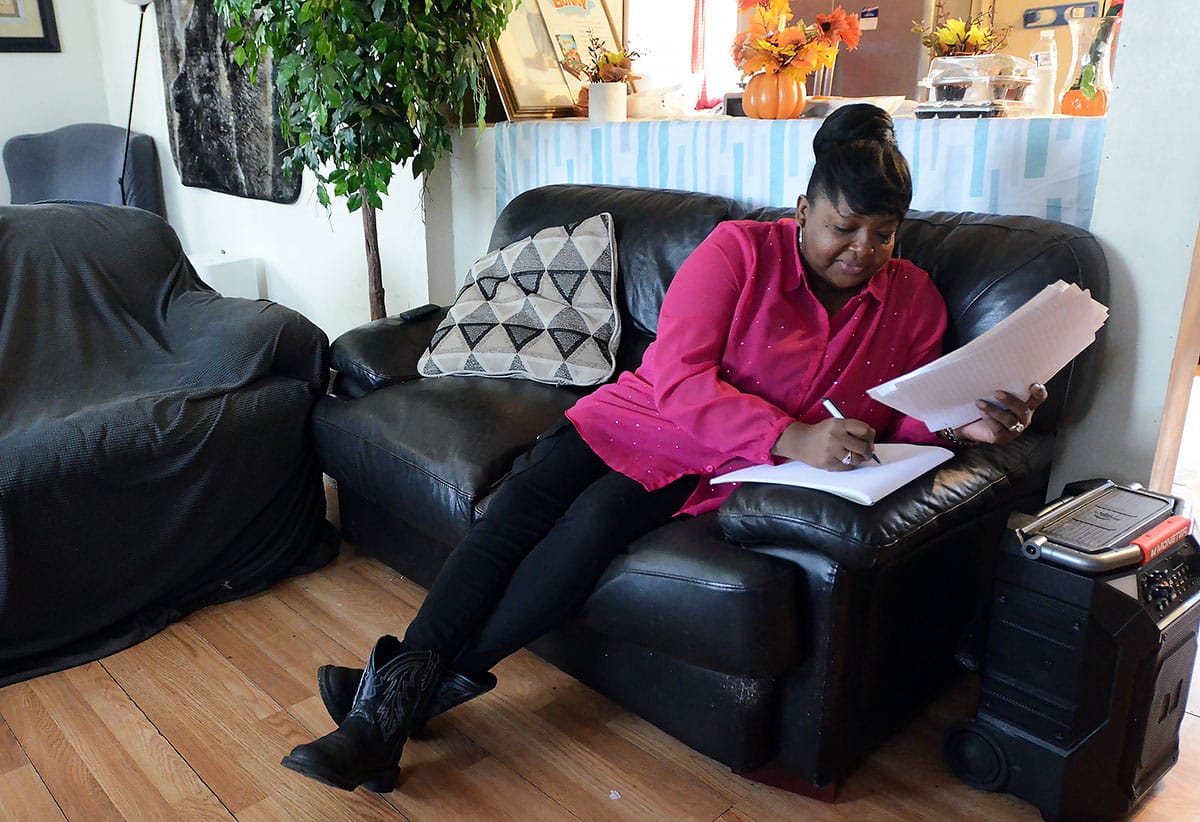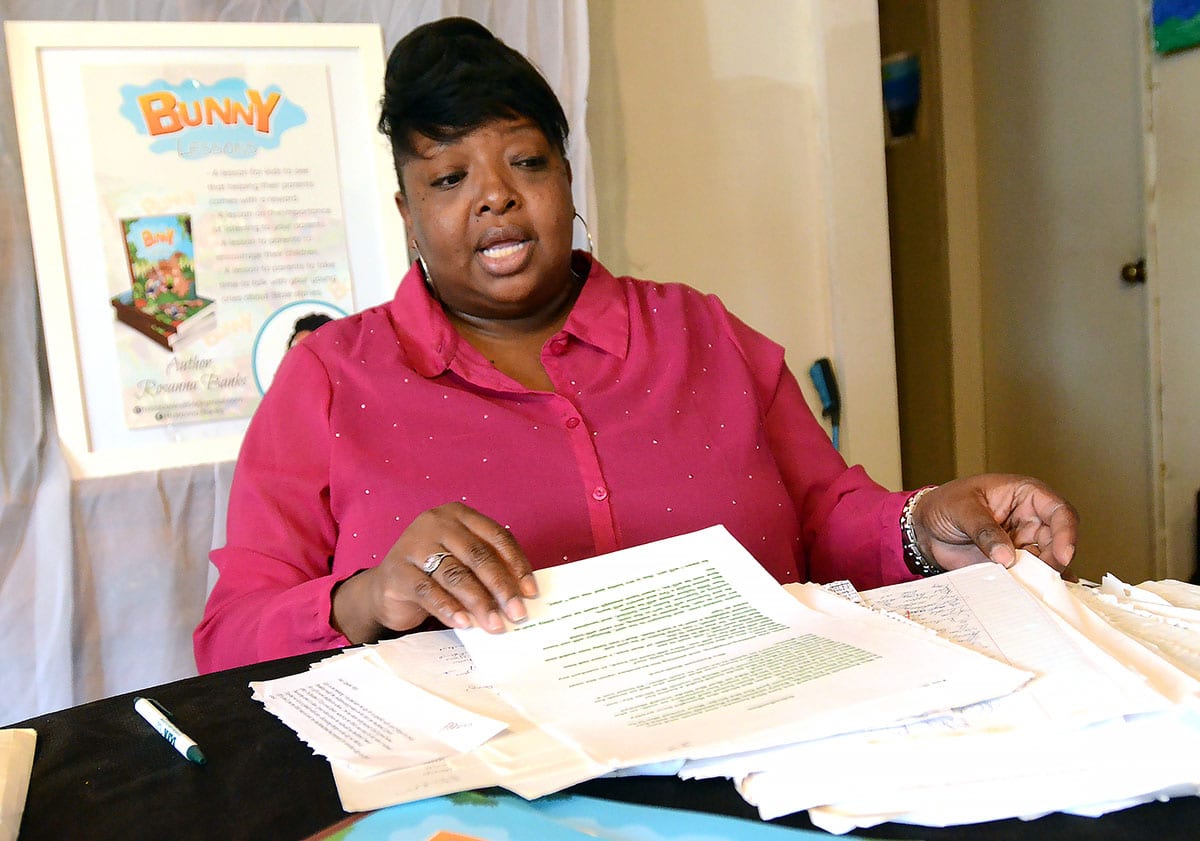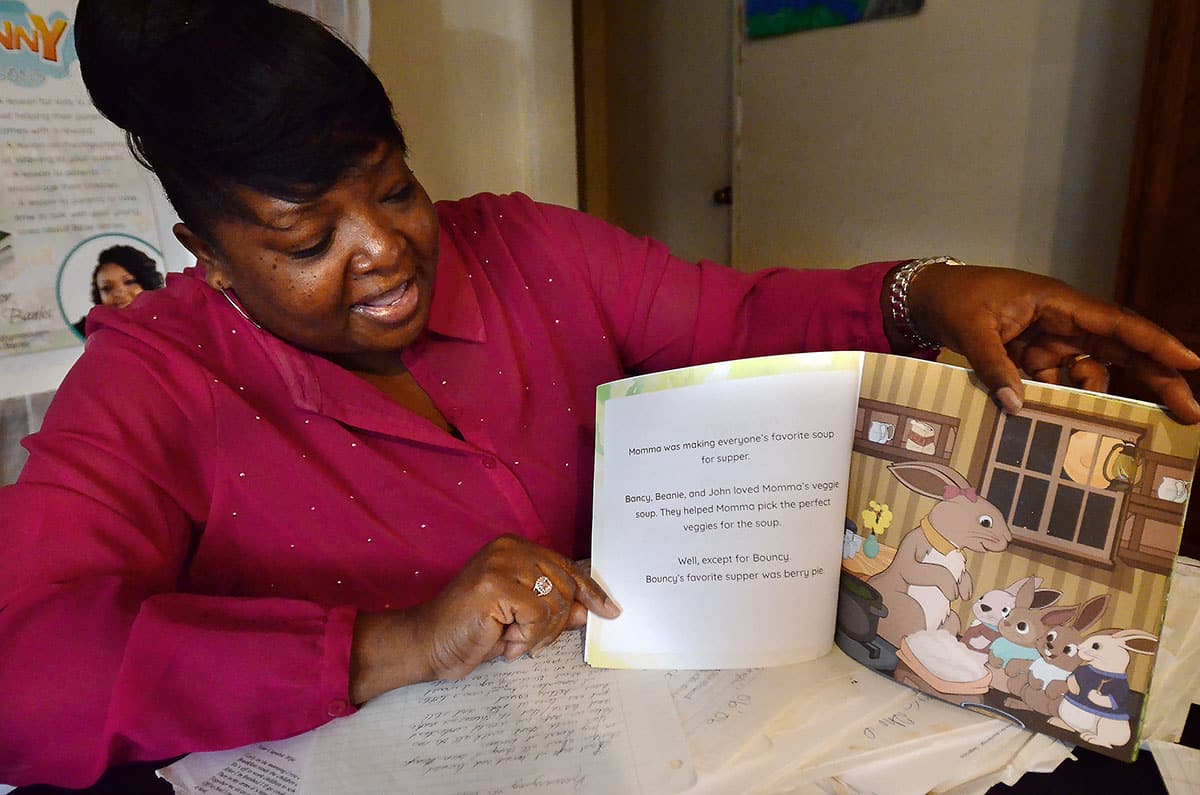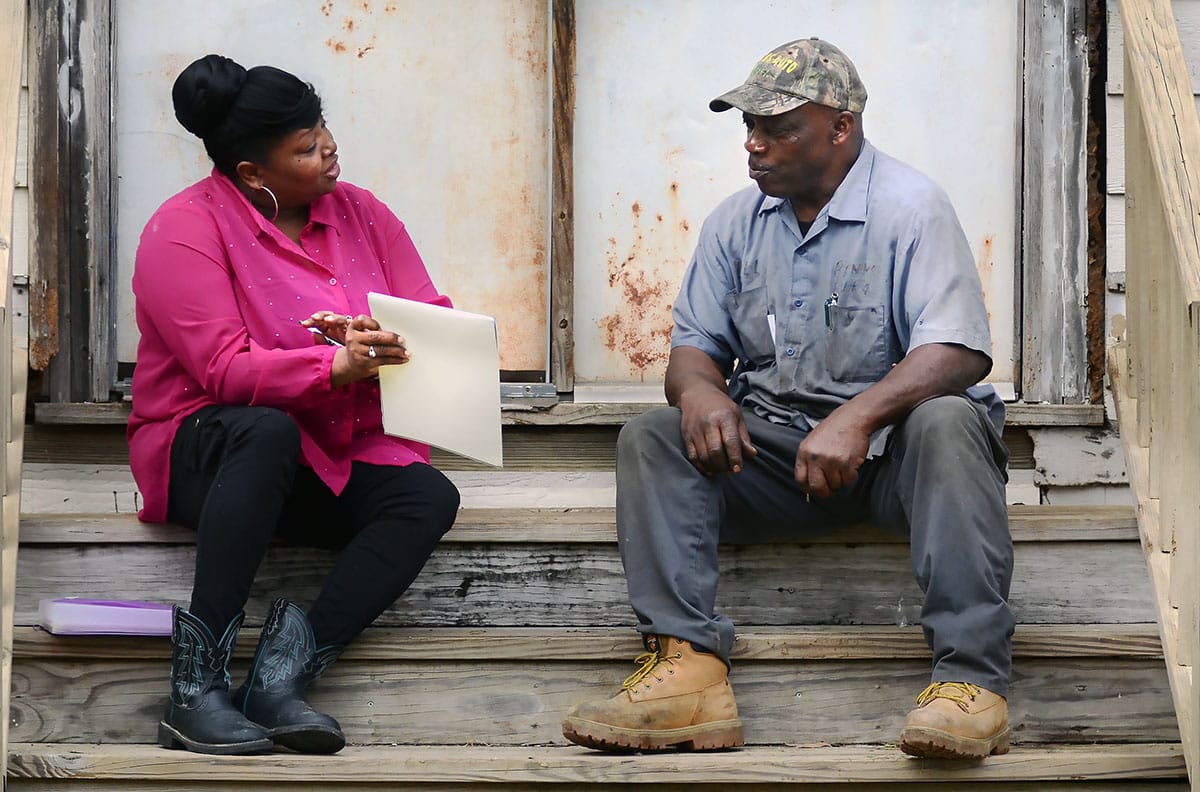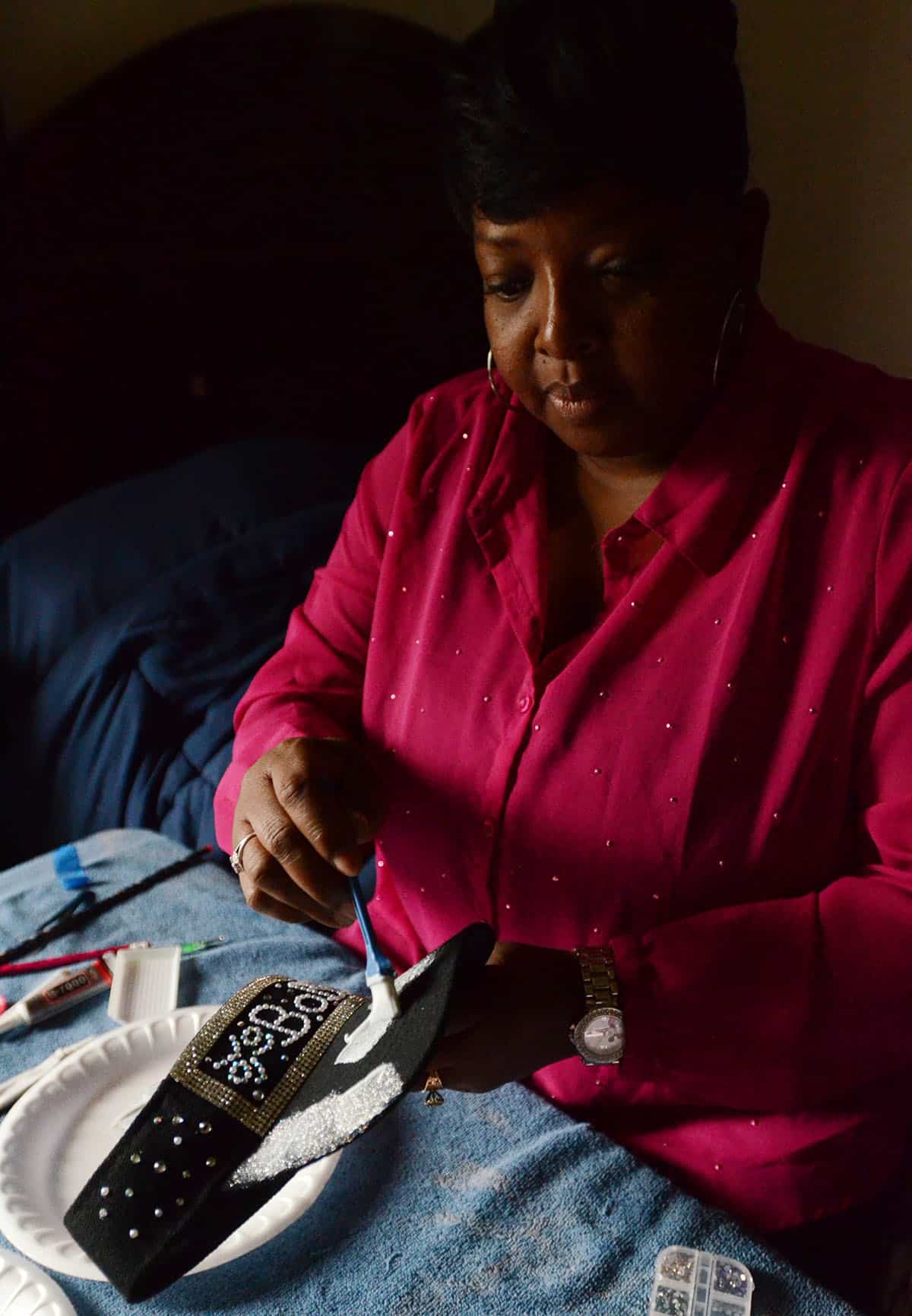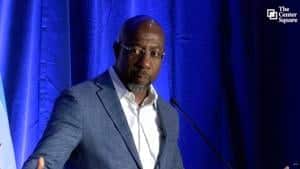Mississippi Today
Rosanna Banks, children’s book author sharing life’s lessons
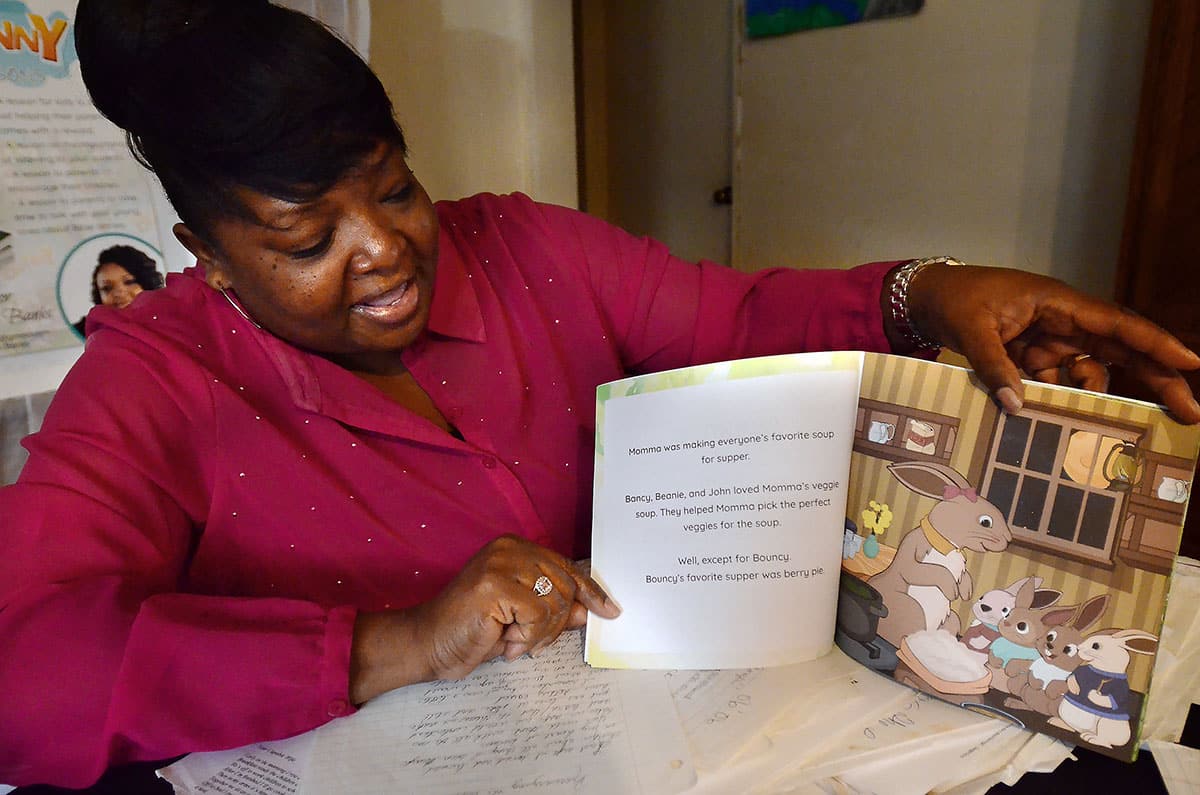
Rosanna Banks has been jotting down ideas and dreaming about the “what can be” in life since she was a 14-year-old filled with the promise of what tomorrow could bring.
She credits her mother and grandmother with planting those seeds, fertilizing her imaginary adventures enriched by many hours in the library and many more hours with her head in a book, as she says, “imagining all the possibilities, because a book can take you away to wherever you’ve never been and wherever you want to go. And I’d write it all down.”
Thirty years later, the 44-year-old mother of four, wife and, now, children’s book author of “Bunny Lessons” sits on the steps of her rural Madison County home, surrounded by notebooks filled with ideas — those possibilities brought on by the vivid imagination swirling in her head, scribbling in notebooks, checking scraps of paper to connect one idea with a thought or plot, a spoken word, before it’s lost in the wind.
Inspiration, she stated, is all around her, fueled by her family, dogs Apollo, Creed and, of course, Rocky — because the family loves the movie, “Rocky.” A myriad of cats dart about. One in particular, Kwob, is especially curious and attentive.
A neighbor’s rooster struts over, flaps to the hood of a vehicle and crows for no apparent reason; a young man on a black horse clops by, which sets off the dogs for a moment before they realize he’s no threat and settle back into a sleepy haze. Her husband Samuel, a mechanic, grooves to a 70s hit blaring from a radio as he works on a car, the music a fitting soundtrack to the flow and rhythm of her afternoon.
Banks writes it all down.
“Bunny Lessons,” published by Kingdom Trailblazers and available on Amazon and at Barnes & Noble, is a tale inspired by her children, the four bunnies in her book. “Teaching them life’s lessons; obey momma and daddy, eat your vegetables, do your homework and your chores. Simple things, yes. But teaching responsibility is always a parent’s goal to raising good, productive people,” said Banks. She pauses a moment in thought, Kwob saunters over, sits and stares in that haughty way cats have about them.
Banks grabs a notebook and writes something down.
“Back in the day, I was going through a major depression,” she says. “Trying to get away from an abusive relationship, I moved in with my mom and I’d take my kids to the park. I’d watch them play and there I was again, thinking and imagining. I’d have my notepad with me, and I’d write down bits and pieces. I’d write on anything I could get my hands on, really, putting these ideas and thoughts together.”
Her husband wanders over, teasing that he has an idea he wants to share and sits down next to her. They chat and laugh for a while before he heads back to his task at hand.
Banks begins to write in her notebook. She looks up, staring out across her property dotted with numerous vehicles that her husband uses for parts and reminisces…
“Sitting in that park back then, I watched my children. I watched the animals. I could hear my mom’s, my grandma’s and God’s voices in my head and the lessons they taught me. And really, this is how writing ‘Bunny Lessons’ came to be.
“My grandma had a garden, too,” she said. “As a little girl I worked in that garden and didn’t even want to be there. But I remember the things it taught me about taking care, responsibility and seeing how work pays off. There’re good lessons in working a garden. So, it’s lessons passed down from my grandma to my mom to me to my kids. And now, I’ve passed some of those lessons to others.
“You see, it’s just like planting a garden. Those lessons, the thoughts, the… ideas, are the seeds. You nurture those planted seeds with life lessons and watch it grow. Next thing you know, family and friends encourage you, and the garden grows into a story you want to share. And it won’t be the last book either. I’ve got ideas,” Banks smiles, tickled at the possibilities.
This article first appeared on Mississippi Today and is republished here under a Creative Commons license.![]()
Did you miss our previous article…
https://www.biloxinewsevents.com/?p=339995
Mississippi Today
Trump appoints former Gov. Phil Bryant to FEMA Review Council as state awaits ruling on tornadoes
President Donald Trump has appointed former Mississippi Gov. Phil Bryant to the FEMA Review Council, which Trump has tasked to “fix a terribly broken system” and shift disaster response and recovery from federal to state government.
The appointment comes as Mississippi awaits a response from the Trump administration on whether it will approve Gov. Tate Reeves’ request for a federal disaster declaration for deadly tornadoes in mid-March. The federal declaration, which Reeves requested April 1, would allow families and local governments devastated by the storms to receive federal assistance. Trump recently denied a similar request for Arkansas.
Trump has said states should shoulder more of the burden for disaster response and recovery, and he and Homeland Security Secretary Kristi Noem have threatened to shut down the Federal Emergency Management Agency altogether.
“I am proud to announce the formation of the FEMA Review Council, comprised of Top Experts in their fields, who are Highly Respected by their peers,” Trump wrote on social media. “… I know that the new Members will work hard to fix a terribly broken System, and return power to State Emergency Managers, who will help, MAKE AMERICA SAFE AGAIN.”
Trump listed other members of the council, including Secretary of Defense Pete Hegseth and Govs. Greg Abbott of Texas and Glenn Youngkin of Virginia.
Bryant, a longtime political ally of Trump, on social media wrote he is, “Honored to receive this appointment …” and that “Unfortunately, we’ve earned a lot of experience with natural disasters and recovery in Mississippi. Let’s Make America Safe Again.”
Mississippi saw seven deaths and an estimated $18 million in destruction from multiple tornadoes on March 14-15, the same storm system that caused damage in Arkansas. The Mississippi Emergency Management Agency reported that 233 homes were destroyed across 14 counties, and hundreds more were damaged.
During the initial aftermath, Reeves told reporters he believed there was a “high likelihood” the state’s damages from the March tornadoes would meet the threshold for FEMA’s Individual Assistance, which provides direct payments to disaster victims.
The Trump administration’s FEMA has denied federal assistance for flooding in West Virginia, tornadoes in Arkansas and a storm in Washington state, and refused North Carolina’s request for extending relief after Hurricane Helene.
After Hurricane Katrina’s devastation in 2005, Mississippi received nearly $25 billion in federal relief spending, which state leaders have credited with saving the state from ruin and allowing communities and families to rebuild.
This article first appeared on Mississippi Today and is republished here under a Creative Commons Attribution-NoDerivatives 4.0 International License.
Note: The following A.I. based commentary is not part of the original article, reproduced above, but is offered in the hopes that it will promote greater media literacy and critical thinking, by making any potential bias more visible to the reader –Staff Editor.
Political Bias Rating: Center-Right
The content presents a fairly neutral tone but leans towards a center-right perspective, particularly in its framing of President Trump’s actions and the appointment of former Mississippi Governor Phil Bryant. It highlights the argument for more state-level responsibility in disaster management, a position typically associated with conservative views. The reference to the Trump administration’s denial of federal assistance to certain states, including Arkansas, aligns with a more fiscally conservative stance that prioritizes reducing federal intervention. However, the mention of the substantial federal aid Mississippi received after Hurricane Katrina adds a historical balance to the perspective, indicating that the piece does not fully align with extreme conservative views.
Mississippi Today
Chris Lemonis fired, national search underway for Mississippi State baseball
Not quite four years after guiding Mississippi State to a baseball national championship, head coach Chis Lemonis has been fired, effective immediately.
Assistant coach Justin Parker will serve as interim head coach for the remainder of the season.
Mississippi State made the announcement in a press release Monday afternoon.
“A change in leadership is what is best for the future of Mississippi State baseball,” State athletic director Zac Selmon said. “We have not consistently met the standard of success that our university, fans and student-athletes expect and deserve. I want to thank Coach Lemonis for his work and the time he gave to our program, including a national championship in 2021. We appreciate his efforts and wish him and his family all the best moving forward.”
A national search is underway to identify the program’s next head coach, Selmon said.
“In a team meeting moments ago, I expressed to our student-athletes the confidence we have in their abilities and the potential they have for the remainder of the season,” Selmon said. “I encouraged them to compete with pride, resilience, and intensity. With the hard work, preparation, and talent already within this group, we are committed to putting them in the best position to finish the season competing at the highest level.
“Mississippi State is the premier job in college baseball. The tradition, the facilities, the NIL offerings and the fan base are all second to none. Dudy Noble Field is the best environment in the sport, period.”
The current Bulldogs have a 25-19 record and are 7-14 in the SEC. Most recently, the Bulldogs lost two of three weekend games to Auburn, the nation’s 11th-ranked team. State has lost its last two SEC series and five of seven this season. The Bulldogs are currently No. 45 in the nation in ratings percentage index (RPI) and are in danger of not making the NCAA Tournament for the third time in four years.
Lemonis’ MSU teams won 232 games and lost 135 in his six-plus seasons. Hired by former MSU baseball coach and athletic director John Cohen from Indiana, Lemonis has an overall coaching record of 373-226-2.
“This program is built for success,” Selmon said. “Our history proves it, and our future demands it. We are one of only four programs in NCAA history to reach the College World Series in six consecutive decades. With 40 NCAA Tournament appearances, 12 trips to Omaha, 11 SEC regular season titles, and a national championship, our program has always been a national contender. That is the bar. We’re going to find a leader who will embrace that, elevate our program and compete for championships.”
This article first appeared on Mississippi Today and is republished here under a Creative Commons Attribution-NoDerivatives 4.0 International License.
Note: The following A.I. based commentary is not part of the original article, reproduced above, but is offered in the hopes that it will promote greater media literacy and critical thinking, by making any potential bias more visible to the reader –Staff Editor.
Political Bias Rating: Centrist
The content provided is a straightforward news report about the firing of a baseball coach, Chis Lemonis, following his achievement of winning a national championship. The information is factual and does not indicate any political leaning, ideology, or bias. It is neutral in tone and intent.
Mississippi Today
MS House member agrees to pre-trial program after indictment
Rep. Keith Jackson, a Democratic lawmaker from Kemper County, can remain in office despite a felony indictment by participating in a pre-trial intervention program, according to court documents.
A grand jury last year indicted Jackson, a first-term House member, on charges of receiving stolen property – specifically, a 2006 Magnolia timber trailer worth about $15,000. The grand jury also indicted two other people, Fredwrick (sic) Young and William Tate, in connection with the criminal charges.
Jackson did not respond to a request for comment, and his attorney, Christopher Collins, declined to comment.
Cassie Colman, the district attorney in the 10th circuit district, told Mississippi Today that the state agreed to let Jackson participate in pretrial intervention because he had no prior criminal record. If Jackson completes the terms of the pre-trial agreement, then the criminal charges will be expunged from his record.
Going to trial would likely be risky for the lawmaker because, if convicted of the offense, he could lose the right to hold elected office.
Receiving stolen property is a disenfranchising crime in Mississippi, and if someone is convicted of a disenfranchising crime, they lose their right to vote. To run for office in Mississippi, someone must be a registered voter.
But Coleman, who prosecuted the case against Jackson, said the legislator’s agreement to enter the program is neither a guilty plea nor a conviction. Instead, he will enroll in the intervention program for at least a year and pay around $3,350 in fees, according to court documents.
If he fails to meet the terms of the agreement, the district attorney could remove him from the program and prosecute him for the original crime.
This article first appeared on Mississippi Today and is republished here under a Creative Commons Attribution-NoDerivatives 4.0 International License.
Note: The following A.I. based commentary is not part of the original article, reproduced above, but is offered in the hopes that it will promote greater media literacy and critical thinking, by making any potential bias more visible to the reader –Staff Editor.
Political Bias Rating: Centrist
The article presents factual information about a Mississippi House member’s legal situation, focusing on the details of the pre-trial intervention program and the potential consequences if he fails to meet the terms. There is no overt political commentary or slant, and it primarily reports on the legal process and actions taken by both the accused lawmaker and the prosecuting district attorney. The tone is neutral, and it avoids sensationalizing the case or making political judgments. Given the absence of opinion or partisanship, the content is categorized as centrist.
-

 SuperTalk FM7 days ago
SuperTalk FM7 days agoNew Amazon dock operations facility to bring 1,000 jobs to Marshall County
-

 News from the South - Missouri News Feed3 days ago
News from the South - Missouri News Feed3 days agoMissouri lawmakers on the cusp of legalizing housing discrimination
-

 News from the South - Florida News Feed7 days ago
News from the South - Florida News Feed7 days agoTrump touts manufacturing while undercutting state efforts to help factories
-

 News from the South - Florida News Feed7 days ago
News from the South - Florida News Feed7 days agoFederal report due on Lumbee Tribe of North Carolina’s path to recognition as a tribal nation
-

 News from the South - Oklahoma News Feed7 days ago
News from the South - Oklahoma News Feed7 days agoOklahoma Treasurer’s Office Faces Scrutiny Over Use of Signal in Anti-ESG Coordination
-

 Mississippi Today2 days ago
Mississippi Today2 days agoDerrick Simmons: Monday’s Confederate Memorial Day recognition is awful for Mississippians
-

 Mississippi Today5 days ago
Mississippi Today5 days agoStruggling water, sewer systems impose ‘astronomic’ rate hikes
-

 News from the South - Georgia News Feed7 days ago
News from the South - Georgia News Feed7 days agoOrganization files ethics complaint against Warnock | Georgia
